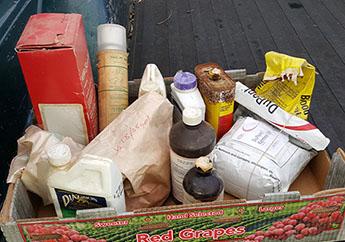
A pesticide is any substance or mixture of substances used to destroy, repel or control certain forms of plant or animal life that are considered to be pests. These substances provide a way to control insects on food crops, rodents that carry diseases and mold and mildew growth. Pesticides include, but are not limited to, herbicides, insecticides, fungicides and rodenticides. Herbicides destroy weeds and other unwanted vegetation. Insecticides control a wide variety of insects. Fungicides are used to prevent mold and mildew growth. Rodenticides are used to control mice and rats.
Concerns
Unfortunately, pesticides can harm more than just the “pests” they target. If improperly disposed of or misused through improper application, such as over-spraying, pesticides can make their way into our soil and groundwater or runoff into streams and lakes. Invertebrates in streams are also insects, just the aquatic or larval forms of the land dwelling (terrestrial) varieties. Pesticides designed for terrestrial insects also affect aquatic insects through the same pathways.
As pests become tolerant of commonly used pesticides, new pesticides are developed to combat them. New advances in pesticides are accompanied by different chemicals, which can lead to new and unstudied contaminants and health concerns. Human exposure to pesticides can cause a number of adverse health effects, including respiratory problems and cancer.
